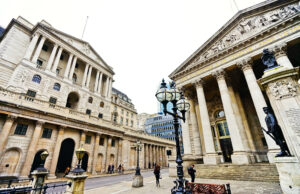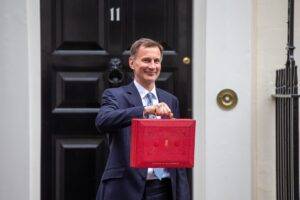Bank of England ‘duty bound’ to trigger recession to curb inflation

Britain’s central bank policymakers are “duty bound” when they meet this week to push the UK into recession to cap rising inflation, a former Bank of England (BoE) official has said.
Adam Posen, who runs Washington-based thinktank the Peterson Institute, said that while the Bank of England would not want workers to lose their jobs, it should hike interest rates now to squeeze out inflationary pressures made worse by Brexit trade and immigration restrictions.
The BoE’s monetary policy committee (MPC) meets on Thursday and is expected to increase interest rates by 0.25%, taking the central bank’s base rate to 1% – its highest level since early 2009. Inflation in March peaked at 7% – its highest level for 30 years.
Posen, who was a member of the MPC from 2009 to 2012, said the central bank needed to take more drastic action after Brexit reduced the UK’s labour supply and limited the flexibility of the workforce. Without a U-turn by the government on trade restrictions and immigration policy, the BoE must shrink the economy.
“The central bank has no choice but to cause a recession when a broad range of prices are rising at such a strong pace,” he said.
“It is duty bound to bring inflation down after more than a year when it has been more than 2 percentage points above its 2% target level during a period of full employment.”
He said wages were increasing due to shortages of workers and this was likely to add to inflationary pressures over several years unless further interest rate hikes were imposed. He added that if wages failed to keep pace with inflation over the rest of the year, it showed that the wage bargaining power of workers was weak and there was even more reason to put the brakes on rising prices.
“There is a greater risk of inflation persisting without further action in the UK compared with other major economies. The US is going through a period of high inflation that monetary policy will arrest. Euro area countries don’t really have much inflation other than the spike in energy and food prices caused by the Ukraine war.
“The UK, on the other hand, has Brexit, which is going to restrict the supply of labour over the longer term, and trade restrictions that will keep prices higher than they would otherwise be,” he said.
Opinion is divided among academics and City analysts over the next steps by the central bank, with some, including Posen’s predecessor on the MPC, the labour market economist Danny Blanchflower, arguing that rates need to remain low to protect an economy already heading for recession.
Blanchflower, a professor at the Ivy League university Dartmouth College, said several recent indicators showed the UK was already heading into recession and it would be irresponsible for the BoE to give it an extra push.
But those calling for a succession of interest rate increases this year argue the faster pace of wage increases and strong levels of savings among middle and higher income groups will mean demand outstrips supply, generating even higher inflation. They say firms lack the skilled workers and raw materials needed to meet demand, and are likely to respond by increasing prices further.
Shortages of workers pushed vacancy rates to a fresh record in the latest labour market figures covering the three months to February. The worst affected industries – IT, manufacturing, construction and hospitality – were those that relied most on foreign-born workers, mostly from the EU, Posen said.
He added the UK was “far more open to trade and immigration, and attractive for foreign investment before the 2016 Brexit vote”.
Ken Rogoff, a Harvard professor and former chief economist at the International Monetary Fund, said: “A recession in Europe is almost inevitable if the war in Ukraine escalates, and the Chinese economy may already be in recession.
Writing on the Project Syndicate website, he added: “And with US consumer prices currently increasing at their fastest rate in 40 years, prospects for a soft landing for prices without a big hit to growth look increasingly remote.”
Last week the Brexit opportunities minister, Jacob Rees-Mogg, said Britain would postpone physical checks on fresh food imported from the EU for a fourth time, citing the likelihood they would cost UK firms £1bn in red tape.
A report last week by researchers at the LSE Centre for Economic Performance said that the introduction of new post-Brexit trading rules last year caused a “major shock” to UK-EU trade.
The research found UK imports from the EU fell by 25% relative to those from elsewhere in 2021.
Its authors suggested new rules had also caused many smaller businesses to terminate relationships with suppliers based in the EU and stop exporting to the 27-member trading bloc.




